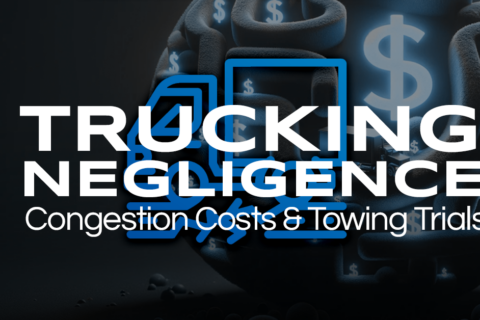In an ever-evolving logistics landscape, recent revelations have surfaced that are both startling and thought-provoking for the trucking and logistics sectors. Whether it’s the shocking negligence that has thrown light on the systemic issues within the trucking safety practices, the record-breaking congestion costs that continue to haunt trucking firms, or the brewing controversies around towing practices, these stories bear significant consequences. While some incidents underscore the critical gaps in regulations and oversight, others magnify the financial and operational challenges that commercial drivers and logistics companies grapple with daily. Let’s unravel the intricacies of these headlines and their potential implications. Shocking Negligence: Insurance Void and Fatal Consequences Weld County has been rattled by a severe accident on I-25 that transpired in June 2022, resulting in five fatalities. Revelations from a recent federal court filing indicate that the trucking company involved, Caminantes Trucking, operated without insurance for over two years before the tragic incident. Previously insured by State Farm, their coverage was revoked in 2020 due to “severe safety violations and unsafe history.” Despite this, the Federal Motor Carrier Safety Administration (FMCSA) was kept in the dark about this lack of coverage, allowing Caminantes Trucking to perilously remain on the road. Even the United States Postal Service, despite the risk, continued their contract with the uninsured company. Oversights, Tragedies, and Lingering Questions Victims Aaron Godines, Hailie Everts, their infant, and Aaron’s parents were sadly killed in the crash. The heart-wrenching details highlight several oversights: State Farm should’ve informed the government of the policy cancellation; the FMCSA should have enforced its regulations by preventing the truck’s operation, and the Postal Service should have ensured the company’s insurance status before entering into any contract. On top of these failures, damning evidence reveals the truck had faulty brakes and was operated by an unlicensed driver. Despite these glaring irregularities, the FMCSA merely imposed a fine, and USPS maintained its contract with the trucking company for several months post-accident. The tragic incident underscores broader systemic issues and prompts grave concerns about the safety practices of other trucking firms. 🔗 Dive into the full details of this shocking story here. Staggering Congestion Costs: A Trucking Nightmare In 2021, a record-breaking $94.6 billion in congestion-related costs was borne by trucking firms, as revealed by a comprehensive study conducted by the American Transportation Research Institute (ATRI). Congestion, whether habitual or incident-induced, leads to reduced road capacity and slower vehicle speeds, ultimately increasing trip durations. This, in turn, augments operational expenses for trucking companies, encompassing direct costs such as driver remuneration, fuel expenses, and vehicle maintenance, as well as indirect societal expenses like disrupted supply chains and reduced air quality. States Bear the Brunt: Congestion and Financial Impacts Breaking down the figures, the congestion costs in 2021 surged by 22.4% from 2020 and were 27% above the 2016 benchmark. Alarmingly, congestion costs for trucks ascended at over double the inflation rate, majorly influenced by rising diesel prices and trucking volumes. Notably, populous states like California, Texas, Florida, and New York suffered the most, with congestion costs ranging from $4.9 billion for New York to a whopping $9 billion for California. Intriguingly, Nevada, Louisiana, and Georgia observed the sharpest percentage hikes compared to 2016. Offering a broader perspective, the congestion cost spread across the nation’s trucks averages at $6,824 per truck annually, equivalent to 3% of the average revenue per truck in 2021. With these statistics in hand, ATRI intends to update this study yearly, aiding Congress in assessing infrastructure investment requirements, especially with the focus on reducing congestion and enhancing freight transportation. 🔗 Dive deeper into the congestion cost analysis here. Towing Troubles: Big Rigs in the Crosshairs In a concerning turn of events, a Tennessee towing company known as A-1 Towing has been under scrutiny for its alleged rampant and illegal towing practices targeting big rigs in truck stop lots. As stated by Memphis’ WREG, the number of complaints against A-1 Towing has surged, prompting interventions by the Tennessee Highway Patrol and the Tennessee Department of Safety and Homeland Security. The Memphis Police’s Criminal Investigation Division is also actively investigating the company’s actions, highlighting the severity of the issue. Victims Speak Out: The Exorbitant Towing Fees Several trucking companies and owner/operators have reported being unfairly targeted by A-1’s predatory towing tactics. One Alabama-based trucking company owner detailed an incident where his driver was quickly towed by A-1 and was charged a staggering $4,500 to retrieve the 18-wheeler. Another trucking company owner from Iowa shared a similar tale, with their driver being hit with a $2,450 fee. In violation of Memphis’ booting ordinance, A-1 has been reportedly charging truckers $275 for boot removals, while the ordinance stipulates a maximum of $50. Defending its practices, A-1 Towing issued a statement emphasizing its adherence to laws and protocols, refuting allegations of illicit activities. 🔗 Discover more about A-1 Towing’s controversial practices here. Before You Hit The Road… The complexities within the trucking and logistics sectors often manifest in myriad ways, with some stories highlighting stark oversights and others shedding light on operational challenges. The tales of negligence, congestion costs, and towing troubles shared here are but a snapshot of the multifaceted realm of commercial driving and logistics. Your perspectives and insights on these matters can shape future discussions and practices. So, we encourage you to share your thoughts in the comments section. And remember, as the road ahead unfolds with more tales and lessons, make sure to join us next week for another edition of Optimum Logistic’s weekly news recap. Safe travels and happy hauling! If you made it to this part of the article, we’d just like to take a moment to thank you for taking the time to read this weekly recap. Be safe out there and as always, If you’re in search of CDL A, B, or warehouse positions, check out our open positions. And if you need staffing solutions for commercial driving or industrial positions, be sure to explore our offerings.











Recent Comments